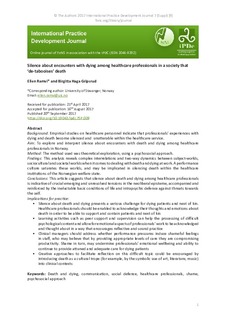| dc.contributor.author | Ramvi, Ellen | |
| dc.contributor.author | Gripsrud, Birgitta Haga | |
| dc.date.accessioned | 2017-10-03T08:29:17Z | |
| dc.date.available | 2017-10-03T08:29:17Z | |
| dc.date.created | 2017-09-28T15:04:28Z | |
| dc.date.issued | 2017 | |
| dc.identifier.citation | International Practice Development Journal. 2017, 7 . | nb_NO |
| dc.identifier.issn | 2046-9292 | |
| dc.identifier.uri | http://hdl.handle.net/11250/2457966 | |
| dc.description.abstract | Background: Empirical studies on healthcare personnel indicate that professionals’ experiences with dying and death become silenced and unutterable within the healthcare service.
Aim: To explore and interpret silence about encounters with death and dying among healthcare professionals in Norway.
Method: The method used was theoretical exploration, using a psychosocial approach.
Findings: This analysis reveals complex interrelations and two-way dynamics between subject-worlds, sociocultural and societal worlds when it comes to dealing with death and dying at work. A performance culture saturates these worlds, and may be implicated in silencing death within the healthcare institutions of the Norwegian welfare state.
Conclusions: This article suggests that silence about death and dying among healthcare professionals is indicative of crucial emerging and unresolved tensions in the neoliberal episteme, accompanied and reinforced by the ineluctable basic conditions of life and intrapsychic defence against threats towards the self.
Implications for practice:
•Silence about death and dying presents a serious challenge for dying patients and next of kin. Healthcare professionals should be enabled to acknowledge their thoughts and emotions about death in order to be able to support and contain patients and next of kin
•Learning activities such as peer support and supervision can help the processing of difficult psychological content and allow for emotional aspects of professionals’ work to be acknowledged and thought about in a way that encourages reflective and sound practice
•Clinical managers should address whether performance pressures induce shameful feelings in staff, who may believe that by providing appropriate levels of care they are compromising productivity. Shame in turn, may undermine professionals’ emotional wellbeing and ability to continue to provide attuned and adequate care for dying patients
•Creative approaches to facilitate reflection on this difficult topic could be encouraged by introducing death as a cultural trope (for example, by the symbolic use of art, literature, music) into clinical contexts | nb_NO |
| dc.language.iso | eng | nb_NO |
| dc.rights | Navngivelse-Ikkekommersiell 4.0 Internasjonal | * |
| dc.rights.uri | http://creativecommons.org/licenses/by-nc/4.0/deed.no | * |
| dc.subject | death and dying | nb_NO |
| dc.subject | døden | nb_NO |
| dc.subject | communication | nb_NO |
| dc.subject | healthcare professionals | nb_NO |
| dc.subject | psychosocial approach | nb_NO |
| dc.subject | shame | nb_NO |
| dc.subject | tabu | nb_NO |
| dc.subject | social defence | nb_NO |
| dc.title | Silence about encounters with dying among healthcare professionals in a society that ‘de-tabooises’ death | nb_NO |
| dc.type | Journal article | nb_NO |
| dc.type | Peer reviewed | nb_NO |
| dc.description.version | publishedVersion | nb_NO |
| dc.rights.holder | © The Authors 2017 | nb_NO |
| dc.subject.nsi | VDP::Medisinske Fag: 700::Helsefag: 800::Sykepleievitenskap: 808 | nb_NO |
| dc.source.pagenumber | 12 | nb_NO |
| dc.source.volume | 7 | nb_NO |
| dc.source.journal | International Practice Development Journal | nb_NO |
| dc.identifier.doi | 10.19043/ipdj.7SP.009 | |
| dc.identifier.cristin | 1499865 | |
| cristin.unitcode | 217,13,0,0 | |
| cristin.unitname | Det helsevitenskapelige fakultet | |
| cristin.ispublished | true | |
| cristin.fulltext | original | |
| cristin.qualitycode | 1 | |

